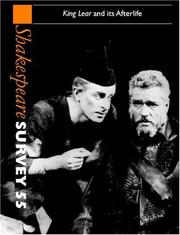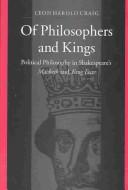| Listing 1 - 5 of 5 |
Sort by
|

ISBN: 0521815878 9780521815871 Year: 2002 Volume: 55 Publisher: Cambridge Cambridge University Press
Abstract | Keywords | Export | Availability | Bookmark
 Loading...
Loading...Choose an application
- Reference Manager
- EndNote
- RefWorks (Direct export to RefWorks)
Shakespeare, William, --- Criticism and interpretation. --- King Lear (Shakespeare) --- Literatura inglesa (crítica e interpretação) --- Shakespeare, William. --- King Lear (Shakespeare, William). --- King Lear (Shakespeare). --- Shakespeare, William --- Critique et interprétation. --- Shakespeare, William, - 1564-1616 - Criticism and interpretation. --- Shakespeare, William, - 1564-1616. - King Lear --- Shakespeare, William, - 1564-1616
Book
ISBN: 9781442652996 1442652993 9781442654907 1442654902 1442652993 0802062792 9780802062796 Year: 1974 Publisher: Toronto
Abstract | Keywords | Export | Availability | Bookmark
 Loading...
Loading...Choose an application
- Reference Manager
- EndNote
- RefWorks (Direct export to RefWorks)
The image of the prism, with its multiple refractions, offers some sense of the inexhaustible variety of a work of art. Like a prism, King Lear is attractive; like a prism, it is a multiply shaped thing; like a prism, it is an object of admiration, as well as an instrument of analysis. The essays in this book - forming neither a casebook nor a 'perplex' - were written because their authors wanted to understand something specific about this very complicated play. Throughout, the emphasis is on Shakespeare's consciousness of his craft, on his critical use of the materials, notions, and devices available to him - on the play (prism-like) as an instrument of analysis. Although the different contributors have occasionally influenced one another's readings of the play, the essays were written independently; that they are so mutually supportive is the result of the play's central insistence on its own primary meaning, visible from whatever perspective a serious reader may take.
Shakespeare, William, --- Lear, --- King Lear --- Leir, --- Legends --- History and criticism. --- LITERARY CRITICISM / Shakespeare. --- King Lear (Shakespeare, William) --- Shakespeare's King Lear (Shakespeare, William) --- Shakespeare's The tragedie of King Lear (Shakespeare, William) --- Tragedie of King Lear (Shakespeare, William) --- M. William Shake-speare, his true chronicle history of the life and death of King Lear, and his three daughters (Shakespeare, William) --- True chronicle history of the life and death of King Lear, and his three daughters (Shakespeare, William) --- Complete King Lear, 1608-1623 (Shakespeare, William) --- Parallel King Lear, 1608-1623 (Shakespeare, William) --- Liŏ Wang (Shakespeare, William) --- Tragedy of King Lear (Shakespeare, William) --- Shakespeare's Tragedy of King Lear (Shakespeare, William) --- King Lear experience (Shakespeare, William) --- History of King Lear (Shakespeare, William)
Book
ISBN: 9783770545827 3770545826 3846745820 9783846745823 Year: 2009 Publisher: München Fink
Abstract | Keywords | Export | Availability | Bookmark
 Loading...
Loading...Choose an application
- Reference Manager
- EndNote
- RefWorks (Direct export to RefWorks)
Seit der Antike repräsentiert der Fluch die Gewalt des Gottesgerichts in der Sprache und changiert dabei zwischen Verkündigung und Vollzug. Auch im Übergang zur Neuzeit verschwindet dieses sakrale Supplement der Rechtsprechung nicht: Eine Abundanz von zitierten Flüchen und seiner Derivate Segen, Prophetie und Eid spielt speziell in der Genese des frühneuzeitlichen Theaters eine entscheidende Rolle. An Shakespeares Historiendramen treten solche Verstrickungen besonders prononciert hervor: Ob "Richard III" die Eucharistie und die Exkommunikation für das Theater in Beschlag nimmt, "King John" das Gottesurteil in die Warenform überführt oder "King Lear" die wuchernden Aporien des Naturrechts entfaltet - immer erweisen sich in unerwarteten Überlagerungen von Theologie-, Theater- und Rechtsgeschichte Shakespeares Performanzen des Fluchs als ideale Leitfossilien einer von ihren mythischen Latenzen überwältigten Säkularisierung.
Book
ISBN: 9781487570521 148757052X 9781487570514 1487570511 Year: 2023 Publisher: Toronto ; Buffalo ; London : University of Toronto Press,
Abstract | Keywords | Export | Availability | Bookmark
 Loading...
Loading...Choose an application
- Reference Manager
- EndNote
- RefWorks (Direct export to RefWorks)
How would our world look if we took critical hope, empathy, and love as the starting point for our learning and our lives? Shakespeare's Guide to Hope, Life, and Learning presents a conversation between Shakespeare's most popular plays and our modern experience, between teachers and learners, and between the hopeful and the world at large. The book analyses four Shakespeare plays--King Lear, Hamlet, As You Like It, and Henry V--and reveals how they help us to occupy, appreciate, and responsibly interrogate the perspectives of others. Lisa Dickson, Shannon Murray, and Jessica Riddell explore a diversity of genres--tragedy, history, and comedy--with distinct perspectives from their own lived experiences. They carry on lively conversations in the margins of each essay, mirroring the kind of open, on-going and collaborative thinking Shakespeare demands of us. In their quest for critical empathy, they approach each play with the question: "What is the most wonderful thing about teaching this play in our classrooms?" The book is informed by ideas of justice and transformation, articulated by such thinkers as Paulo Freire, Parker J. Palmer, Ira Shor, John D. Caputo, and bell hooks. In exploring the joy of teaching and experiencing Shakespeare, Shakespeare's Guide to Hope, Life, and Learning advocates for a critical hope that arises from classroom experiences and moves into the world at large.
Hope in literature. --- Life in literature. --- Learning and scholarship in literature. --- Espérance dans la littérature. --- Vie dans la littérature. --- Savoir et érudition dans la littérature. --- Shakespeare, William, --- As you like it (Shakespeare, William) --- Hamlet (Shakespeare, William) --- Henry V (Shakespeare, William) --- King Lear (Shakespeare, William)

ISBN: 0802086055 080203571X 9786612014635 1282014633 1442677996 9781442677999 9781282014633 9780802035714 9780802086051 Year: 2001 Publisher: Toronto, Ont. University of Toronto Press
Abstract | Keywords | Export | Availability | Bookmark
 Loading...
Loading...Choose an application
- Reference Manager
- EndNote
- RefWorks (Direct export to RefWorks)
"This work argues that Shakespeare was as great a philosopher as he was a poet, and that his greatness as a poet derived even more from his power as a thinker than from his genius for linguistic expression. Accordingly, Leon Craig's interpretation of the plays - focusing primarily on Macbeth and King Lear, but including extensive comments on Othello, The Winter's Tale, and Measure for Measure - are intended to demonstrate what can be gained from reading Shakespeare 'philosophically.'"--Jacket
Politics in literature --- Politiek in de literatuur --- Politique dans la littérature --- Politics in literature. --- Shakespeare, William, --- Knowledge --- Political science. --- Political science in literature --- Šekspir, Vil'jam --- Sciarrino, Salvatore. --- Shakespeare, William --- Political science --- Shakespear, William, --- Shakspeare, William, --- Šekʻspiri, Uiliam, --- Saixpēr, Gouilliam, --- Shakspere, William, --- Shikisbīr, Wilyam, --- Szekspir, Wiliam, --- Šekspyras, --- Shekspir, Vilʹi︠a︡m, --- Šekspir, Viljem, --- Tsikinya-chaka, --- Sha-shih-pi-ya, --- Shashibiya, --- Sheḳspir, Ṿilyam, --- Shaḳspir, Ṿilyam, --- Syeiksŭpʻio, --- Shekspir, V. --- Szekspir, William, --- Shakespeare, Guglielmo, --- Shake-speare, William, --- Sha-ō, --- Şekspir, --- Shekspir, Uiliam, --- Shekspir, U. --- Šekspir, Vilijam, --- Ṣēkspiyar, Viliyam, --- Shakspir, --- Shekspyr, Vyli︠e︡m, --- Şekspir, Velyam, --- Ṣēkspiyar, Villiyam, --- Shēkʻspʻiyr, Vlilliam, --- Ṣēkspiyar, --- Ṣēkspiyar Mahākavi, --- Ṣēkspiyar Mahākaviya, --- Sheḳspier, Ṿilyam, --- Shēkʻspir, --- Shakespeare, --- Śeksper, --- Шекспир, Вильям, --- Шекспир, Уильям, --- שייקספיר, וויליאם, --- שייקספיר, וו., --- שיקספיר, וויליאם --- שיקספיר, ויליאם --- שיקספיר, ויליאם, --- שכספיר, ויליאם, --- שכספיר, וילים, --- שכספיר, ו׳ --- שעפקספיר, וויליאם, --- שעקספיער, וויליאם --- שעקספיער, וויליאם, --- שעקספיער, ווילליאם --- שעקספיער, וו., --- שעקספיר --- שעקספיר, וו --- שעקספיר, וויליאם, --- שעקספיר, וויליאמ --- שעקספיר, ווילליאם --- שעקספיר, ווילליאם, --- שעקספיר, וו., --- שעקספיר, װיליאם, --- שעקספיר, װילליאם, --- שעקספיר, װ., --- שעקספער --- שעקספער, וויליאמ --- שקספיר --- שקספיר, וו --- שקספיר, וויליאם --- שקספיר, וויליאם, --- שקספיר, ווילים, --- שקספיר, וילאם --- שקספיר, ויליאם --- שקספיר, ויליאם, --- שקספיר, ויליים, --- שקספיר, וילים --- שקספיר, וילים, --- شاكسبير، وليم --- شاكسپير، وليم --- شكسبير، وليام --- شكسبير، وليم --- شكسبير، وليم، --- شكسبير، و. --- شكسپير، وليم --- شكسپير، ويليام --- شيكسبير، وليام --- شيكسبير، وليام.، --- شيكسبير، وليم --- شکسبير، وليم --- وليم شکسبير --- 沙士北亞威廉姆, --- 沙士比亞威廉姆, --- 莎士比亞威廉姆, --- 莎士比亞威廉, --- 莎士比亞, --- LITERARY CRITICISM / European / English, Irish, Scottish, Welsh. --- Macbeth (Shakespeare, William) --- King Lear (Shakespeare, William) --- Great Britain. --- Shakespeare's King Lear (Shakespeare, William) --- Shakespeare's The tragedie of King Lear (Shakespeare, William) --- Tragedie of King Lear (Shakespeare, William) --- M. William Shake-speare, his true chronicle history of the life and death of King Lear, and his three daughters (Shakespeare, William) --- True chronicle history of the life and death of King Lear, and his three daughters (Shakespeare, William) --- Complete King Lear, 1608-1623 (Shakespeare, William) --- Parallel King Lear, 1608-1623 (Shakespeare, William) --- Liŏ Wang (Shakespeare, William) --- Tragedy of King Lear (Shakespeare, William) --- Shakespeare's Tragedy of King Lear (Shakespeare, William) --- King Lear experience (Shakespeare, William) --- History of King Lear (Shakespeare, William) --- Tragedy of Macbeth (Shakespeare, William) --- Illustrated Macbeth (Shakespeare, William) --- Shakespeare's The tragedie of Macbeth (Shakespeare, William) --- Tragedie of Macbeth (Shakespeare, William) --- Macbeth for young people (Shakespeare, William) --- Works of William Shakespeare (Shakespeare, William) --- Shakespeare's Macbeth (Shakespeare, William) --- William Shakespeare's Macbeth (Shakespeare, William) --- Anglia --- Angliyah --- Briṭanyah --- England and Wales --- Förenade kungariket --- Grã-Bretanha --- Grande-Bretagne --- Grossbritannien --- Igirisu --- Iso-Britannia --- Marea Britanie --- Nagy-Britannia --- Prydain Fawr --- Royaume-Uni --- Saharātchaʻānāčhak --- Storbritannien --- United Kingdom --- United Kingdom of Great Britain and Ireland --- United Kingdom of Great Britain and Northern Ireland --- Velikobritanii͡ --- Wielka Brytania --- Yhdistynyt kuningaskunta --- Northern Ireland --- Scotland --- Wales
| Listing 1 - 5 of 5 |
Sort by
|

 Search
Search Feedback
Feedback About UniCat
About UniCat  Help
Help News
News